Marine Life & Conservation
Glasgow Uni students research under the Red Sea at Roots
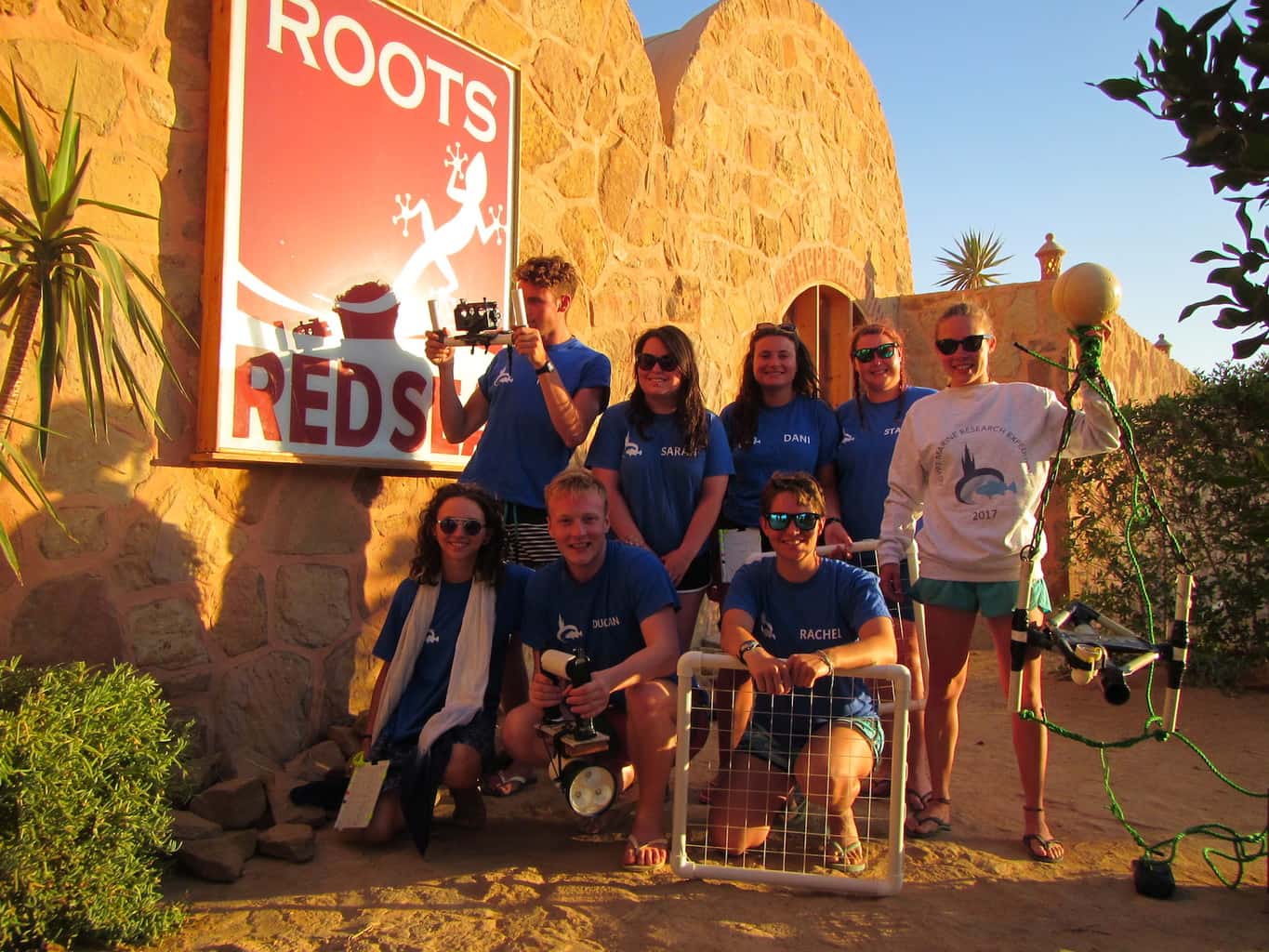
Our new blogger, Guy Henderson, reports on this summer’s undergraduate research expedition at the Open Ocean Science Centre at Roots Camp, El Quseir, Egypt…
June and July are busy months for science at Roots Camp and Pharaoh Dive Club El Quseir. This is when the annual University of Glasgow marine research expedition is based on site at the Open Ocean Science Centre. The students will be here until the end of July undertaking fieldwork for dissertations and doing data analysis in the purpose built marine lab. The team consists of eight members painstakingly selected way back in October. They have spent the last 8 months designing projects, applying for grants, fundraising and honing their diving skills. There is a good range of experience within the team with one first year, two second years, a fourth year (recently graduated) and four third year honours students. The third years will be collecting data for their dissertations and each have been assigned a buddy from the remaining team members to help with data collection.
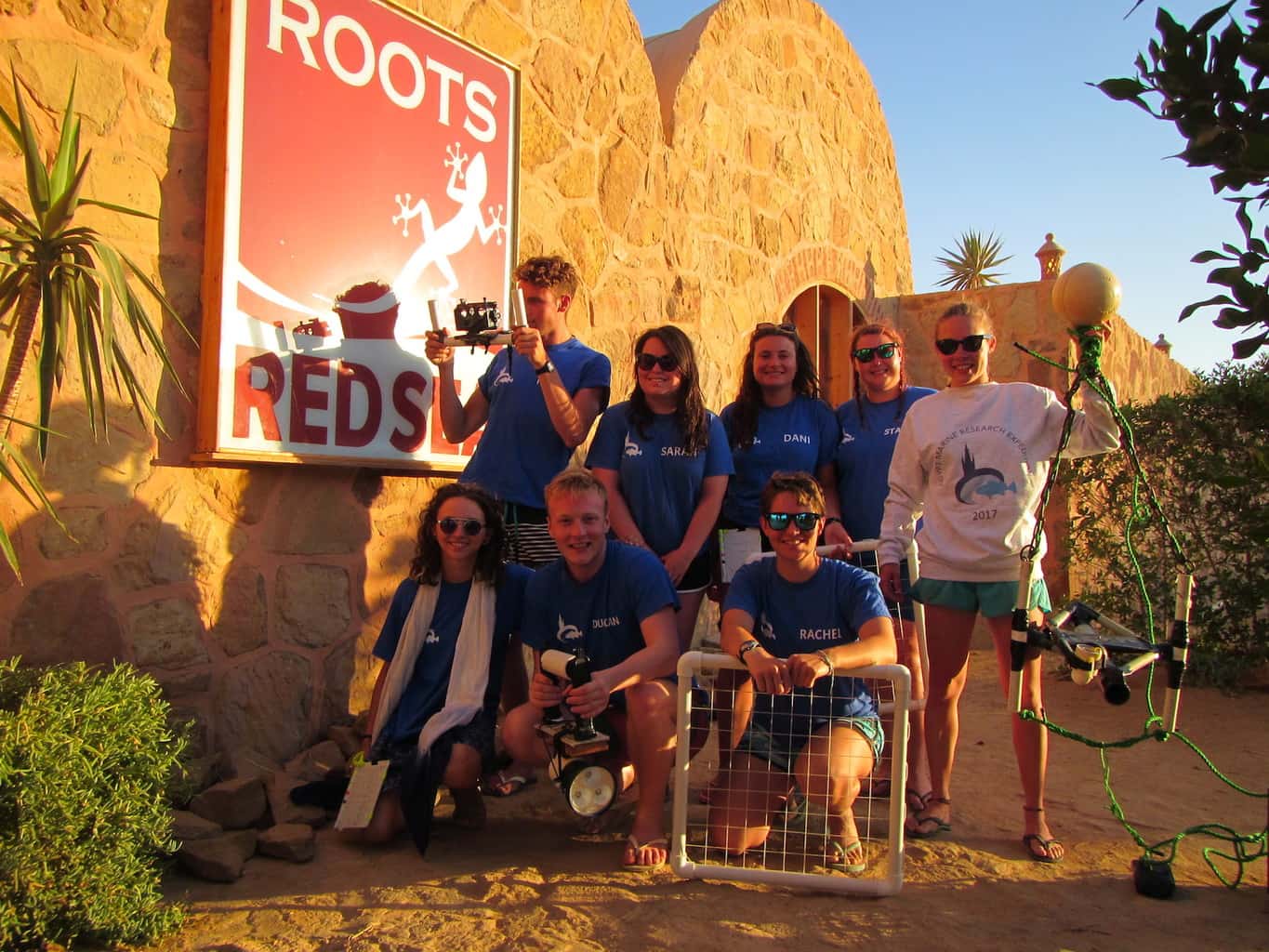
GU Egypt Marine Expedition 2017: Left to Right, Back to Front – Max, Sarah, Dani, Stacey, Bella, Clara, Duncan & Rachel
Pilot studies and equipment familiarisation went without a hitch and the projects are all well underway with a substantial amount of data already collected. Below we will introduce the individual project methodologies and scientific relevance. We have two diving projects which are undertaken by members with diving qualifications at rescue level or higher, a shore based project on the reef flat and a rather exciting camera drop project which makes use of the speedboat.
Bella & Sarah – Camera drops in the mesophotic zone
Bella is investigating arguably the most mysterious of reef habitats; Mesophotic Coral Ecosystems (MCEs). Ranging in depths from 30 to 150 metres, MCEs receive enough light penetrating the surface waters for vibrant life but are generally too deep for traditional scuba diving techniques so are vastly understudied in comparison to shallow reefs. Round the globe there are gaps in our knowledge but particularly in the Red Sea, where the diverse marine life has yet to be fully charted on the map of scientific research.
Bella is using an innovative technique to capture footage of fish at varying depths within the MCE range. She is doing this by dropping a 3D camera off an RIB at GPS marked co-ordinates, 75-degree bearings from the shore, at depth level increments of roughly 10 metres. The footage will be used to identify and count all the fish found at each depth level as well as measure their biomass using EventMeasure software. Guy and her have been working hard on the construction of an intricate rig structure to protect the camera in the water, which will be essential to the effective success of the drops.
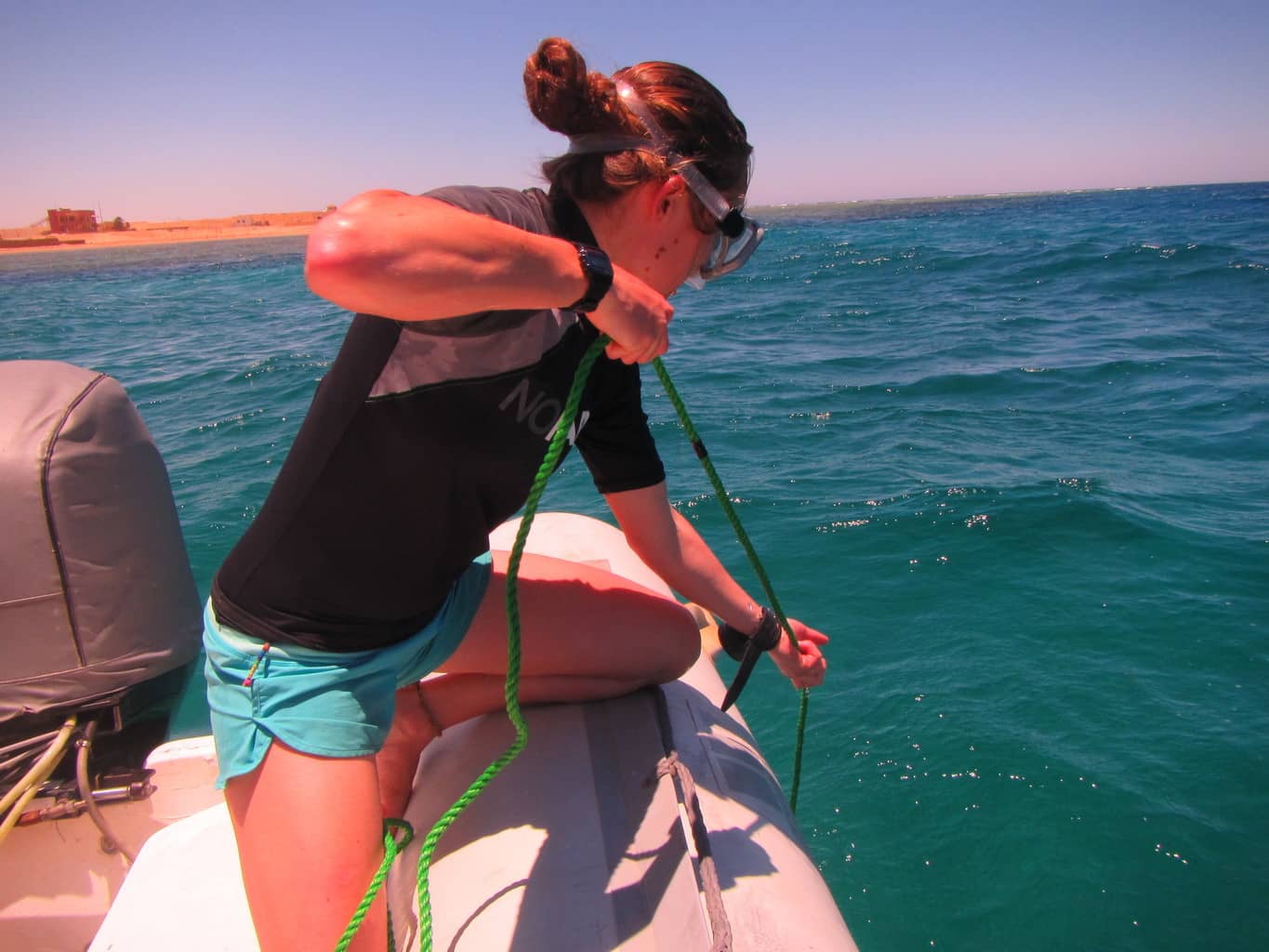
Bella deploying her 3D drop camera rig at Ras Quseir
Duncan & Rachel – Coral cover and light intensity
Duncan will be quantifying the effect of Photosynthetically active radiation (PAR) on the community structure of scleratinian (Hard) corals on the Abu Sautir reef. Understanding the impact differing PAR levels have on coral abundance and diversity will indicate the importance of light as an abiotic driver of coral community composition. Coupled with the lack of research and relevant literature in the Red Sea, Duncan’s study will provide valuable data relating to coral cover of a highly diverse yet relatively understudied Red Sea fringing reef.

Duncan filming a video transect with a custom camera mount
Clara & Stacey – Reef flat, rock pool diversity
Clara is investigating how factors such as distance from the shore, pH and salinity affect species diversity within the rock-pools in Abu Sautir. This is done by creating transects on the shore and using quadrat sampling to determine the species diversity and abundance. Rock-pools are found in intertidal habitats which may be extreme environments for inhabiting organisms; this is due to tidal changes, rough wave action and fluctuating water parameters. Some organisms have physiological coping mechanisms that help them survive the fluctuation in these conditions, such as starfish which can regulate their salt uptake. However those that are less well adapted to these variable conditions may not be found across the entire range of rock-pools, therefore it will be interesting to discover how the various species are distributed across the reef flat.
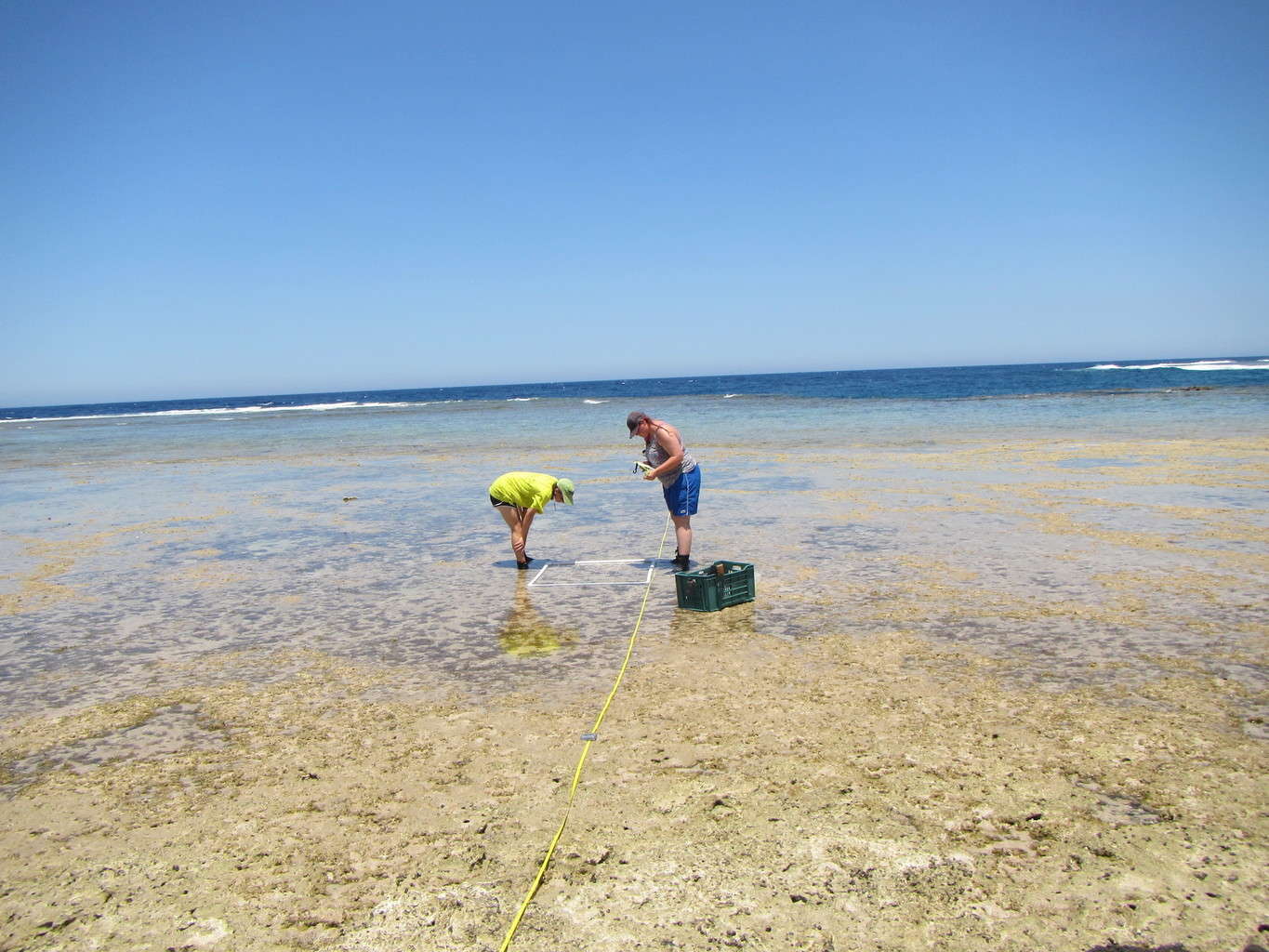
Clara and Stacey surveying a quadrat on the house reef Abu Sautir
Max & Dani – Hawkfish behaviour study
Max will be working on our longest running project by supplementing a 3 year data set. The hawkfish behaviour study aims to look at bold-shy behaviour of freckled hawkfish (Paracirrhites forsteri) in relation to mortality rates from year to year. Using 3D camera technology and photo identification software, the relative boldness of individual fish can be found and calculated by means of a simulated predator prey interaction. Animal behavioural studies are usually limited to lab settings with controlled conditions; this project is exciting as it allows us to look at the behaviour of fish in their natural habitats while investigating traits that may contribute to the evolution of populations.
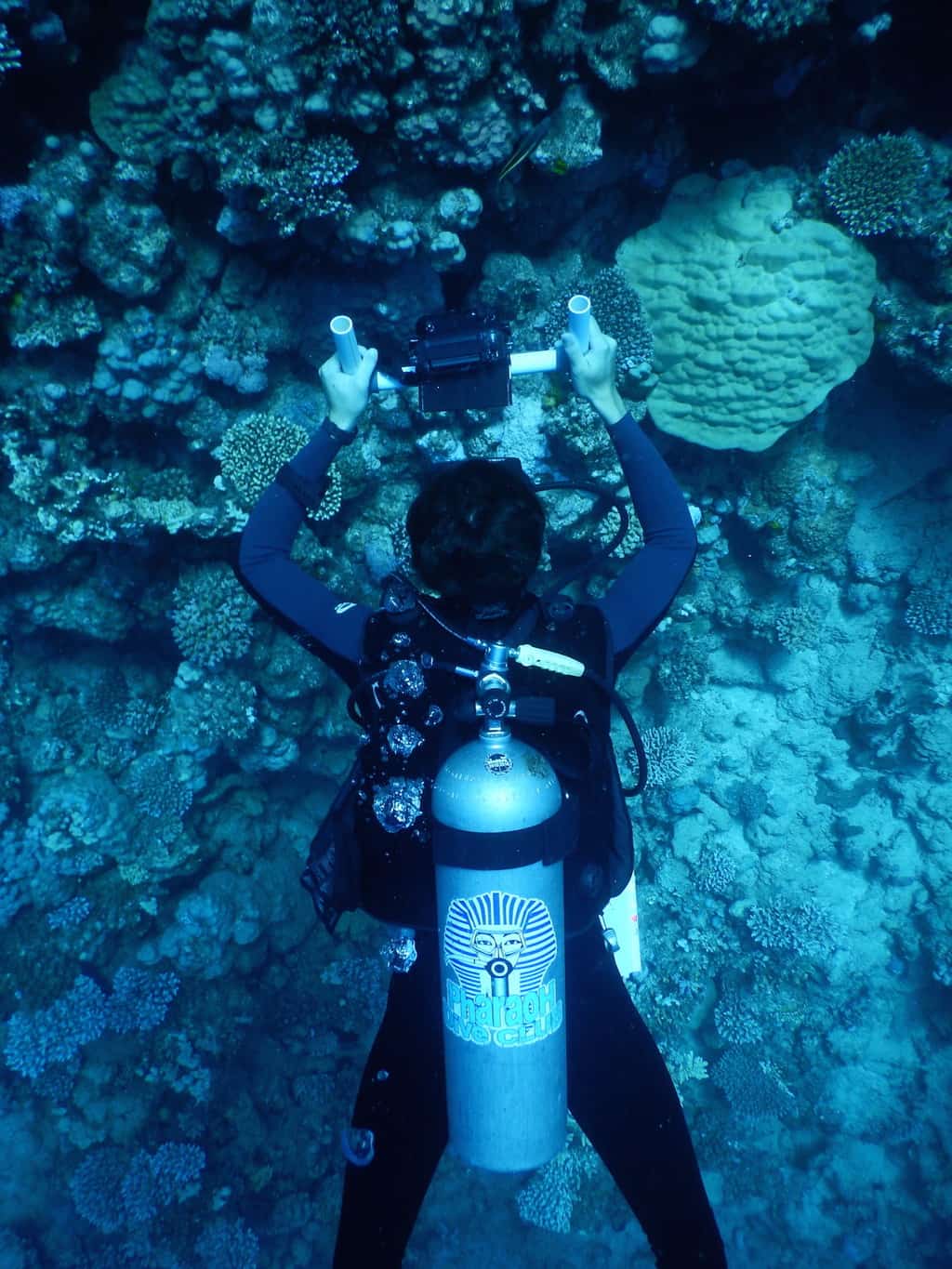
Max ‘scaring’ a freckled hawkfish and recording the outcome in 3D
Aside from the Student expedition we have a number of volunteers with us throughout the summer months. The volunteers work closely with the local community organising clean up dives, beach and mangrove clean ups and educational outreach programmes with local schools and youth groups.
In the next instalment of this blog we will catch up with the volunteers and the students to see what they have been getting up to as well as checking on how the projects are progressing.
Follow the expedition Facebook page at www.facebook.com/GUEgypt2013/ or on twitter @guegypt
You can also visit: www.openoceanproject.org, www.rootsredsea.com and www.pharaohdiveclub.co.uk
Marine Life & Conservation
Double Bubble for Basking Sharks

 The Shark Trust is excited to announce that, for two more days only, all donations, large or small, will be doubled in the Big Give Green Match Fund!
The Shark Trust is excited to announce that, for two more days only, all donations, large or small, will be doubled in the Big Give Green Match Fund!
Donate to Basking in Nature: Sighting Giants
The Shark Trust is hoping to raise £10k which will be doubled to £20k. This will go towards Basking in Nature: Sighting Giants. And they need YOUR help to reach they’re goal.
The Shark Trust’s citizen science project is to monitor and assess basking sharks through sightings; encouraging data collection, community engagement, and promoting nature accessibility. This initiative aims to enhance health and wellbeing by fostering a deeper connection with British Sharks.
Campaign Aims
- Increase citizen science reporting of Basking Sharks and other shark sightings to help inform shark and ray conservation.
- Provide educational talks about the diverse range of sharks and rays in British waters and accessible identification guides!
- Create engaging and fun information panels on how to ID the amazing sharks and rays we have on our doorstep! These can be used on coastal paths around the Southwest. With activities and information on how you can make a difference for sharks and rays!
- Promote mental wellbeing through increasing time in nature and discovering the wonders beneath the waves!
Donate, and double your impact. Click Here
Marine Life & Conservation
Leading UK-based shark conservation charity, the Shark Trust, is delighted to announce tour operator Diverse Travel as a Corporate Patron

 Corporate Patrons provide a valuable boost to the work of The Shark Trust. The Trust team works globally to safeguard the future of sharks, and their close cousins, the skates and rays, engaging with a global network of scientists, policymakers, conservation professionals, businesses and supporters to further shark conservation.
Corporate Patrons provide a valuable boost to the work of The Shark Trust. The Trust team works globally to safeguard the future of sharks, and their close cousins, the skates and rays, engaging with a global network of scientists, policymakers, conservation professionals, businesses and supporters to further shark conservation.
Specialist tour operator Diverse Travel has operated since 2014 and is committed to offering its guests high quality, sustainable scuba diving holidays worldwide. Working together with the Shark Trust will enable both organisations to widen engagement and encourage divers and snorkellers to actively get involved in shark conservation.
“Sharks are truly at the heart of every diver and at Diverse Travel, we absolutely share that passion. There is nothing like seeing a shark in the wild – it’s a moment that stays with you forever!” says Holly Bredin, Sales & Marketing Manager, Diverse Travel.
“We’re delighted to celebrate our 10th year of business by becoming a Corporate Patron of the Shark Trust. This is an exciting partnership for Diverse and our guests. We will be donating on behalf of every person who books a holiday with us to contribute towards their vital shark conservation initiatives around the world. We will also be working together with the Trust to inspire divers, snorkellers and other travellers to take an active role – at home and abroad – in citizen science projects and other activities.”
Paul Cox, CEO of The Shark Trust, said:
“It’s an exciting partnership and we’re thrilled to be working with Diverse Travel to enable more divers and travellers to get involved with sharks and shark conservation. Sharks face considerable conservation challenges but, through collaboration and collective action, we can secure a brighter future for sharks and their ocean home. This new partnership takes us one more valuable step towards that goal.”
For more information about the Shark Trust visit their website here.
For more about Diverse Travel click here.
-

 News3 months ago
News3 months agoHone your underwater photography skills with Alphamarine Photography at Red Sea Diving Safari in March
-

 News3 months ago
News3 months agoCapturing Critters in Lembeh Underwater Photography Workshop 2024: Event Roundup
-

 Marine Life & Conservation Blogs2 months ago
Marine Life & Conservation Blogs2 months agoCreature Feature: Swell Sharks
-

 Blogs2 months ago
Blogs2 months agoMurex Resorts: Passport to Paradise!
-

 Blogs2 months ago
Blogs2 months agoDiver Discovering Whale Skeletons Beneath Ice Judged World’s Best Underwater Photograph
-

 Gear Reviews3 months ago
Gear Reviews3 months agoGear Review: Oceanic+ Dive Housing for iPhone
-

 Marine Life & Conservation2 months ago
Marine Life & Conservation2 months agoSave the Manatee Club launches brand new webcams at Silver Springs State Park, Florida
-

 News3 months ago
News3 months agoWorld’s Best Underwater Photographers Unveil Breathtaking Images at World Shootout 2023


















